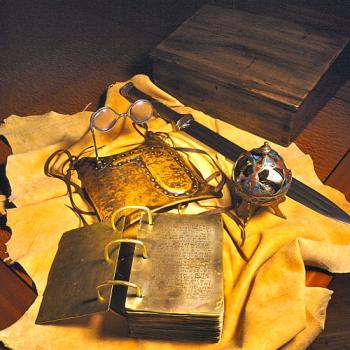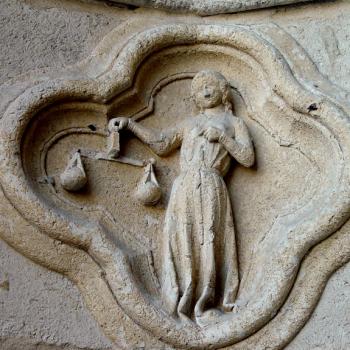 Lectionary Reflections for Ash Wednesday
Lectionary Reflections for Ash Wednesday
Joel 2:1-2, 12-17
I once began a sermon on a text from the prophet Joel by saying, "Locusts are the Rambos of the insect world." However foolish, and now rather dated, my sentence was, and is, I wanted my hearers that day to sense something of the very mysterious activities represented by these marauding insects. It could well be said that locusts are grasshoppers on steroids. Even in the 21st century, those who study insects are not certain just why simple grasshoppers on occasion are transformed into vast clouds of "cutting, swarming, hopping, and destroying" (Joel 1:4), equal opportunity consumers of all they can reach. I once experienced an infestation of locusts in Phoenix, AZ. It occurred at mid-day in a blazing hot summer. There were so many insects on wing that the street lamps came on as the sun was blotted out. We walked on dead carcasses for days, crunching them under foot.
The prophet Joel clearly experienced such a plague sometime in the post-exilic period (5th or 4th century B.C.E.), but he did not see it as a momentary nuisance or a memorable, though inexplicable, natural disaster. For him, the raging and devouring insect hoard was a sign from YHWH that disaster was coming to Israel. One would expect a prophet to say that! Proof positive, as if any more were needed, that I am no prophet!
The locust plague is the backdrop for Joel's plaintive and urgent demand for repentance, and the reason why a reading from this prophecy is regularly included as we begin the season of Lent. We, like Israel in the time of Joel, are in need of repentance, for their lives and ours are far from the paths that God has established for us.
Joel urges his people to get back to serious religious devotion, demanding that they "lament like a virgin in sackcloth" (1:8), "sanctify a fast, call a solemn assembly . . . and cry out to YHWH" (1:14). Joel's call for repentance is extremely urgent. "Blow the trumpet in Zion," he shouts. "Sound the alarm on my holy mountain! Let all the inhabitants of the land tremble, for the day of YHWH is coming; it is near" (2:1).
The locust plague has been but a foreshadowing of something far more dangerous, namely, the day of YHWH. That day is not brightness or joy, however much the priests have tried to calm the people and assuage their fears. Like Amos several centuries before, the day of YHWH is nothing to look forward to with eager anticipation of success and pleasure; it is rather "a day of darkness and gloom, a day of clouds and thick darkness" (2:2). Amos adds the grim figure that the day of YHWH is as if "someone fled from a lion and was met by a bear," or as if "one went into a house, resting a hand against the wall, and was bitten by a snake" (Amos 5:19).
Both Joel and Amos, and the rest of their prophetic cohort, spend the bulk of their anxious words attempting to convince their hearers that God is most assuredly not always glad in the people, not always easy with their behaviors. The locust hoards are merely a sign that God is angry, and that the people are in need of serious repentance. And to the content of that repentance Joel now turns.
"Return to me with all your heart, says YHWH. (Return) with fasting, with weeping, and with mourning; rend your hearts and not your clothing" (2:12-13). As I write those words, I have in my ears the lovely tenor recitative from Felix Mendelssohn's oratorio, "Elijah": "Ye people, rend your hearts and not your garments" (using the KJV). The plaintive cry of the singer nicely captures the cry of the prophet. It is important to remember that the heart in Hebrew anthropology was the seat of will and intelligence, not the place of emotion. Joel's call to "rend their hearts" rather than their clothes, is to say that traditional outward signs of lament (the tearing of clothes and the scattering of dirt on the head) will no longer do. This people, and we, need nothing less than a tearing of the heart, a remaking of our wills if we are to repent truly.
And if we do that, we can be assured that a wondrous God is ready to receive us once again. Joel turns to one of the Hebrew Bible's most glorious and memorable descriptions of YHWH, first uttered on the mountain of Sinai at Exodus 34:6 (and echoed in Neh. 9:17; Ps. 86:15 and 145:8; Jon. 4:2). "YHWH is gracious and merciful, slow to anger, and abounding in steadfast love, and relents from punishing" (Joel 2:13).
In many respects, this familiar quotation is key to a full understanding of what Joel's message of repentance is about. The words used here are stupendous in their importance. The God who calls us to repentance is "gracious." The word means what it means for us: "free gift." Just as "Noah found favor (chen) in YHWH's sight" (Gen. 6:8), he was chosen through no merit of his own, so God is filled with chen for the people. Further, YHWH is "merciful" (rachum). This Hebrew word is rooted in the noun "womb." When the Hebrews attempted to describe the deep compassion of their God, they thought first of a woman's womb and the deep attachment she feels for the child she will give life to.





